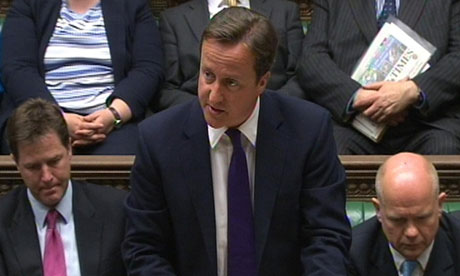Tuesday 3 May 2011 19.27 BST
- Article history

Pakistan must answer searching questions about the "support network" that allowed Osama bin Laden to live in such a populated area of the country, David Cameron said.
As British sources indicated that elements within Pakistan's ISI intelligence service may have shielded the al-Qaida leader in Abbottabad, the prime minister told MPs that Britain would be asking Islamabad to explain his presence in a large compound so close to the capital.
The prime minister told MPs: "The fact that Bin Laden was living in a large house in a populated area suggests that he must have had a support network in Pakistan. We don't currently know the extent of that network, so it is right that we ask searching questions about it. And we will."
Cameron, who last year accused Pakistan of looking "both ways" on terrorism, declined to explain which elements of the Pakistani state may have assisted Bin Laden. But British sources indicated that the ISI, which raided the Bin Laden compound in 2003 and told the BBC that it was embarrassed by his presence in Abbottabad, has known links to al-Qaida and the Taliban.
Cameron sought to focus on the positive side of Pakistan's work in tackling terrorism as he said that Britain should support democrats in Pakistan – Asif Ali Zardari, the president, and Yousuf Raza Gilani, the prime minister. He also pointed out that Barack Obama had said in his statement that "counter-terrorism co-operation with Pakistan" had helped lead the US to the Bin Laden compound.
"Osama bin Laden was an enemy of Pakistan," Cameron said. "He had declared war against the Pakistani people. And he had ordered attacks against them.
"Continued co-operation will be just as important in the days ahead. I believe it is in Britain's national interest to recognise that we share the same struggle against terrorism. That's why we will continue to work with our Pakistani counterparts on intelligence gathering, tracing plots and taking action to stop them."
The prime minister also used his statement to indicate that Britain hopes that the death of Bin Laden will encourage a political settlement in Afghanistan. British combat troops are due to be withdrawn by 2015.
Cameron told MPs: "I don't think it automatically changes the timetable we have and I think we should stick to that timetable. As well as the military track we are pursuing there is this political track of encouraging the Taliban into the political process. I would think that is helped by the fact Bin Laden is no more and they can see the futility of maintaining their link with al-Qaida. If they sever that link then there is every prospect of a political settlement and [that] clearly can lead to British forces coming home. But I don't think we should imagine the timetable will be different."
But he warned that the death of Bin Laden could lead to a "lone wolf" attack. He said: "Clearly there is a risk that al-Qaida and its affiliates in places like Yemen and the Mahgreb will want to demonstrate they are able to operate effectively. And, of course, there is always the risk of a radicalised individual acting alone, a so-called lone-wolf attack. So we must be more vigilant than ever – and we must maintain that vigilance for some time to come."

No comments:
Post a Comment